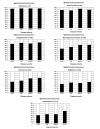Assessing disease disclosure in adults with cystic fibrosis: the Adult Data for Understanding Lifestyle and Transitions (ADULT) survey Disclosure of disease in adults with cystic fibrosis
- PMID: 20831811
- PMCID: PMC2945980
- DOI: 10.1186/1471-2466-10-46
Assessing disease disclosure in adults with cystic fibrosis: the Adult Data for Understanding Lifestyle and Transitions (ADULT) survey Disclosure of disease in adults with cystic fibrosis
Abstract
Background: As more patients with cystic fibrosis (CF) reach adulthood and participate in age-appropriate activities (e.g. employment, dating), disclosure of medical status becomes more important. This study assessed rates of disclosure and its perceived impact on relationships using the Adult Data for Understanding Lifestyle and Transitions (ADULT) online survey.
Methods: Adults with CF participated in the survey via the United States national network of CF Centers. Descriptive and inferential statistics were utilized.
Results: Participants (n = 865) were more likely to disclose to relatives (94%) and close friends (81%) than to dating partners (73%), bosses/supervisors/teachers (51%) or co-workers (39%). Respondents generally reported a neutral/positive effect on relationships following disclosure. Negative effects of disclosure were infrequent, but more likely with dating partners or bosses/supervisors/teachers. Results also indicated that disclosure may be influenced by severity of lung disease and gender, with those having normal/mild lung disease less likely to disclose their diagnosis to both co-workers (p < 0.01) and bosses/supervisors/teachers (p < 0.01), and women being more likely to disclose to close friends (p < 0.0001) and dating partners (p < 0.05) than men.
Conclusions: Most adults with CF disclosed their disease to relatives and close friends. Individuals with severe CF lung disease were more likely to disclose their diagnosis to coworkers and supervisors/teachers. It may be helpful to provide support for disclosure of disease in situations such as employment and dating.
Figures



Similar articles
-
Disease disclosure in individuals with cystic fibrosis: Association with psychosocial and health outcomes.J Cyst Fibros. 2016 Sep;15(5):696-702. doi: 10.1016/j.jcf.2016.02.011. Epub 2016 Mar 17. J Cyst Fibros. 2016. PMID: 26996270 Free PMC article.
-
Only when I cough? Adults' disclosure of cystic fibrosis.Qual Health Res. 2004 Feb;14(2):167-86. doi: 10.1177/1049732303260675. Qual Health Res. 2004. PMID: 14768456
-
To tell or not to tell: negotiating disclosure for people living with HIV on antiretroviral treatment in a South African setting.SAHARA J. 2013 Jul;10 Suppl 1:S17-27. doi: 10.1080/02664763.2012.755320. SAHARA J. 2013. PMID: 23844799
-
The psychosocial and psychiatric side of cystic fibrosis in adolescents and adults.J Cyst Fibros. 2003 Jun;2(2):61-8. doi: 10.1016/S1569-1993(03)00020-1. J Cyst Fibros. 2003. PMID: 15463851 Review.
-
Genetic testing for cystic fibrosis. National Institutes of Health Consensus Development Conference Statement on genetic testing for cystic fibrosis.Arch Intern Med. 1999 Jul 26;159(14):1529-39. Arch Intern Med. 1999. PMID: 10421275 Review.
Cited by
-
Supporting cystic fibrosis disease management during adolescence: the role of family and friends.Child Care Health Dev. 2012 Jul;38(4):497-504. doi: 10.1111/j.1365-2214.2011.01286.x. Epub 2011 Jul 19. Child Care Health Dev. 2012. PMID: 21771002 Free PMC article.
-
Disease disclosure in individuals with cystic fibrosis: Association with psychosocial and health outcomes.J Cyst Fibros. 2016 Sep;15(5):696-702. doi: 10.1016/j.jcf.2016.02.011. Epub 2016 Mar 17. J Cyst Fibros. 2016. PMID: 26996270 Free PMC article.
-
Managing the need to tell: Triggers and strategic disclosure of thalassemia major in Singapore.Am J Med Genet A. 2019 May;179(5):762-769. doi: 10.1002/ajmg.a.61107. Epub 2019 Mar 1. Am J Med Genet A. 2019. PMID: 30821068 Free PMC article.
-
Spontaneous disclosure of BRCA1/2 genetic test results to employers: a French prospective study.Eur J Hum Genet. 2012 Sep;20(9):981-3. doi: 10.1038/ejhg.2012.37. Epub 2012 Feb 29. Eur J Hum Genet. 2012. PMID: 22378286 Free PMC article.
-
A Qualitative Study to Explore the Views and Attitudes towards Prenatal Testing in Adults Who Have Muenke Syndrome and their Partners.J Genet Couns. 2017 Oct;26(5):1130-1142. doi: 10.1007/s10897-017-0094-7. Epub 2017 Mar 22. J Genet Couns. 2017. PMID: 28332077
References
-
- Cystic Fibrosis Foundation. Patient registry annual data report, 2008. 2010. http://www.cff.org/LivingWithCF/QualityImprovement/PatientRegistryReport/
-
- Quittner AL, Modi AC, Boyle MH. The role of independence in daily functioning for adults with cystic fibrosis: Results from the Adult Data for Understanding Lifestyle and Transitions (ADULT) survey. 22nd Annual North American Cystic Fibrosis Conference, Orlando, FL. 2008.
Publication types
MeSH terms
LinkOut - more resources
Full Text Sources
Medical
Research Materials

